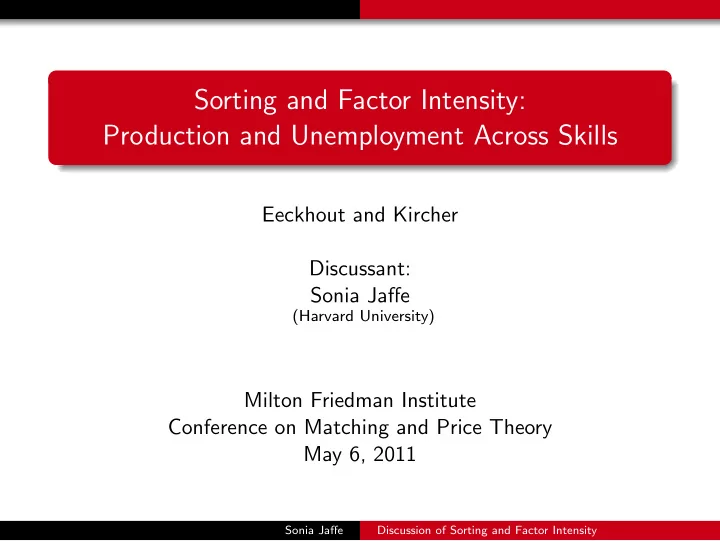

Sorting and Factor Intensity: Production and Unemployment Across Skills Eeckhout and Kircher Discussant: Sonia Jaffe (Harvard University) Milton Friedman Institute Conference on Matching and Price Theory May 6, 2011 Sonia Jaffe Discussion of Sorting and Factor Intensity
Context Matching theory has extended in many directions, BUT it still takes many parameters as given: The quotas in many-to-one matching Firms’ willingness to pay for workers in many-to-one matching with contracts Agents’ preferences in generalized matching Eeckhout and Kircher point out that in many situations these preferences stem from a production function Sonia Jaffe Discussion of Sorting and Factor Intensity
Contribution Microfounding preferences: Endogenize and place some structure on preferences Show conditions on the underlying production function instead of amorphous preferences Sonia Jaffe Discussion of Sorting and Factor Intensity
Contribution Microfounding preferences: Endogenize and place some structure on preferences Show conditions on the underlying production function instead of amorphous preferences They see “intensive” and “extensive” margins as representing a variety of situations: Quality and quantity of workers Hospitals choosing quotas Firm preferences over different { worker , wage } contracts Quantity and distance of housing Quantity or quality of two matched groups: managers and workers or “teams” Sonia Jaffe Discussion of Sorting and Factor Intensity
Possible Extensions How many workers to hire/how many hours to have them work Instead of firm quality, consider the number of worker hours so higher y is more expensive Complementarity ⇒ optimal for a firm to have higher quality workers work more hours Interactions across quality of workers Their “teams” applications starts at this There are complementarities and substitutions across different quality workers Have F take a vector of l ’s and look for conditions on F l i , l j and F l i , r j for firms to hire only one type of worker. Sonia Jaffe Discussion of Sorting and Factor Intensity
Connecting to the Matching Literature Substitutability Wages + concave production Complementarities across qualities would be a problem What if firms do not know their quality / who they will get? I think their framework still rules out complementarity: CES implies that even if a firm can’t get 5 high quality workers it would rather have 4 high quality and a couple low quality than switch to entirely low quality So how do firms set preferences and quotas or wage offers? Sonia Jaffe Discussion of Sorting and Factor Intensity
Recommend
More recommend